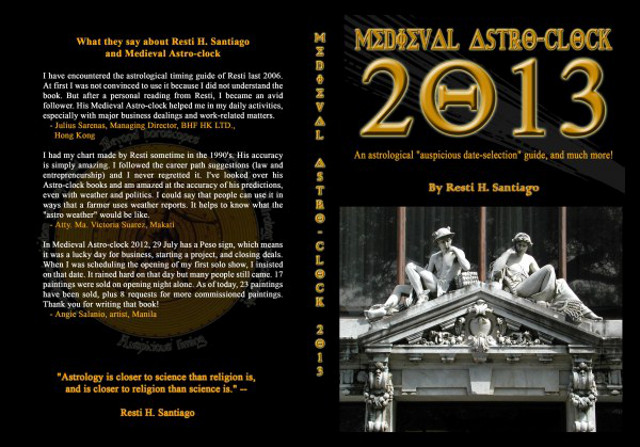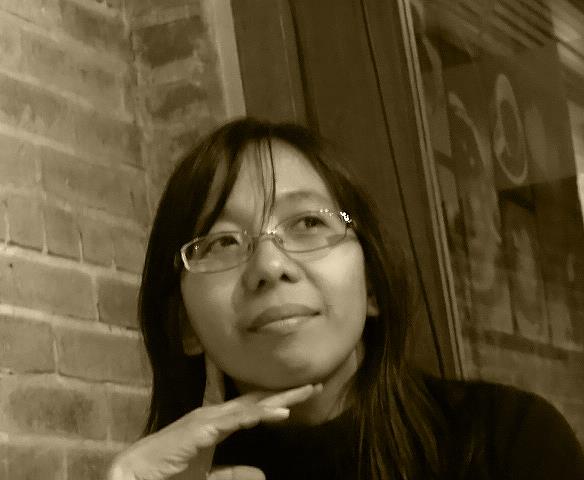SUMMARY
This is AI generated summarization, which may have errors. For context, always refer to the full article.

MANILA, Philippines – Inside my day bag are the following items: planner, notebook, pens, house keys, umbrella, kikay kit, wallet, audio recorder, camera, cell phone, prayer beads (mala), water bottle, shopping bag (because I live in Quezon City), and Resti Santiago’s “Medieval Astro-Clock 2013.”
This book is “an astrological auspicious date-selection guide,” meaning you use it to time your activities according to the principles of electional astrology. “Electional” comes from the word “election” (Latin electio) which means “to choose or select.”
The Medieval Astro-Clock will help you choose the luckiest date and time for important activities like weddings, meetings, signing contracts, making commitments, launching projects, even romantic dates, medical procedures, and many more.
Resti Santiago, one of the few practitioners of Medieval Astrology (this is traditional astrology as opposed to modern astrology) in the country, started to create a very basic Moon Sign calendar in 1997 for the Institute for Inner Studies (ISIS). Five years later, he followed it up with a VOC (Void Of Course) calendar, wherein you use the movement of the moon to time your activities.
As Santiago increased his knowledge in astrology through international courses, professional practice, observation, and experiences, he was able to add more features to his annual calendar project. Today, the Medieval Astro-Clock includes astrological weather forecasts, lucky and unlucky days, moon signs, the Jupiter hours, and many other features.
“Every year I add to it,” Santiago explains. “Now it is a more personalized timing guide because we consider the individual’s ascendant sign.” This is determined through the use of the date and time of birth. Unlike popular or modern astrology, which is applicable to everyone, the information in this book is more specific.
Anyone can use it
“If you are a beginner, you can use it because it is simple enough to understand,” says Santiago.
For example: lucky days are those with stars, or Jupiter hours are the lucky hours in each day. However, if you are an advanced student of astrology, the Medieval Astro-Clock is equally helpful because you can choose to use the more advanced astrological features or parts of the book for a greater level of success.
Santiago practices medieval astrology, the practical kind of astrology that was used during the medieval times by the astrologers of the kings and queens of Europe.
“Modern astrology originated from newspaper columns. It is based on astrology, but it is not actual astrology,” he clarifies. This is the result of modern astrologers’ reinvention of astrology. Unfortunately, the public’s understanding of astrology has been limited to what they read in the horoscope section of publications which, as Santiago points out, is not actually astrology.
A practical tool
Santiago’s book contains the following highlights:
1. Astro-calendar – It is the basic and most useful form of astrology in calendar format. Use it to determine lucky and unlucky days and hours.
2. Jupiter hours – These are the lucky hours in each day.
3. Weather forecasts – These can be used to plan your trips to avoid typhoons and rainy days. Santiago is in the process of learning more about this and refining his knowledge of astro-meteorology, the aspect of astrology that deals with weather prediction using patterns formed by the position of planets.
4. Astrological forecasts for 2013 useful for the Philippines and for our currency
5. Feng Shui tips and forecasts and many more
True stories
Based on personal observation, events that I schedule when the moon is void (VOC) are not always productive. I also find it more of a challenge to write during these hours. The lucky days (with star) feel generally lighter than the square (unlucky) days. Things tend to flow more smoothly on star days.
One of Santiago’s numerous clients, artist Angie Salanio, recalls: “When I was scheduling the opening day of my first solo show, I insisted on July 29, which was a lucky day… It rained hard on that day but many people still came.” She sold 23 paintings in all and got 8 requests for more commissioned work.
The Medieval Astro-Clock works for some, yet Santiago acknowledges that every person has his or her own notion and definition of “luck.” Whether good things that happen in life are to be considered luck or just coincidence is shaped by faith or a personal belief system.
What works for one may not work for others. – Rappler.com
(For more information on the book, you can get in touch with Resti Santiago through resti.astrologer@gmail.com.)
 Ime Morales is a freelance writer and the founder of the Freelance Writers’ Guild of the Philippines (FWGP). She is a new student of medieval astrology under Resti Santiago.
Ime Morales is a freelance writer and the founder of the Freelance Writers’ Guild of the Philippines (FWGP). She is a new student of medieval astrology under Resti Santiago.
Add a comment
How does this make you feel?
There are no comments yet. Add your comment to start the conversation.